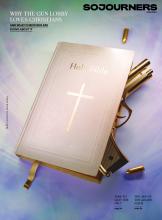JANUARY OPENS THE season of Epiphany: In the North, the light begins to last longer, and we reawaken to the world outside our doors. Each Jan. 6, my family performs the old European Epiphany ritual of “chalking the door” to our home. While I pray, my spouse hoists our kids up to write the blessing on our front lintel. This year the markings will look like this: 20+C+M+B+23. Twenty marks the beginning of the year. The letters recall the Magi (Caspar, Melchior, and Balthazar) whose visit we celebrate and also the Latin prayer: Christus mansionem benedicat (“May Christ bless the house”). The final number closes out the year. The markings are strange. We’re asked about them often. We recall the great light that led the people out of Egypt, the great star that guided the Magi, and the Holy Family’s hospitality. These signs keep evil spirits out and invite God’s Spirit in. And that’s a lot to explain to the FedEx guy.
But Epiphany is a lot! It invites us to explore the complex roles we play in God’s redemption: our complicity in evil as we reach for the good, our relationship to violence, and how we’ll practice hospitality post-COVID.
In this season we also travel with the community of Jesus-followers at Corinth. Much like them, Christians today have become increasingly divided — even among those who agree on the values of compassion, community, and caring for those most vulnerable. The pandemic has made it difficult to find a vision for how to live out our shared values. What striking illumination will this season bring?
Read the Full Article

